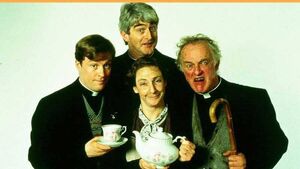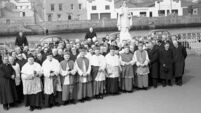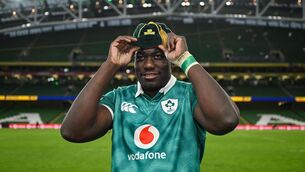Ireland could do with a sense of humour

'Father Ted', that most Irish and Catholic of television series - and scripted by two Irish writers - had to be produced in London.
I think it’s fair to say that a sense of humour is not among the most obvious of our national characteristics. Unlike, for example, our nearest neighbour. Indeed there’s a case to be made that, for the English, humour is a significant part of the very vocabulary of their distinctive Englishness - indeed essential to the way they communicate the values they hold dear.
It would be difficult to imagine the great English writers like Shakespeare, Chaucer, Jane Austen, Dickens, even Thackeray without the at least occasional leaven of humour. And during the war the incorrigible cheerfulness of the English, as Hitler's bombs rained down on them, was part of a consistent and concerted effort not to concede anything to Germany, even a psychological advantage as the plucky inhabitants of London and Liverpool got on with their lives as the bombs rained down on them.
Indeed, in later years, the BBC television series summed up the lively sense of the ridiculous and the underlying respect for humour that became something of a national characteristic. Laughing at themselves became a way of life, almost a necessity to camouflage the desperate circumstances in which they lived.
In Ireland humour isn't accorded the same respect or status. While we acknowledge easily enough the value of humour as a distraction, a safety valve, a necessary antidote to a contrived seriousness, we don't afford it any great significance. It would be difficult, for example, to imagine the Irish army or its lesser dispensations being given the treatment. Indeed the continued failure of RTÉ Television to produce anything remotely like a successful comedy series confirms the point, not least the fact that , that most Irish and Catholic of television series, and scripted by two Irish writers, had to be produced in London.
The kind of understated, faintly ridiculous, but beautifully observed mockery that made, for example, the BBC’s such a success is quite simply beyond us. While we are surrounded with comic possibilities and we never needed the leaven of humor more than now there is no audience for a publication like . That gentle mocking, disrespectful grace is not part of the national lexicon. (Another indication of this national malaise is our inability to produce even one cartoonist of international repute.)
Part of the difficulty is that as we are a small, and for that reason vulnerable, entity with an almost insatiable need to be liked even loved. We haven't the confidence that size brings. So, to make up for our deficiencies, we believe the carefully constructed myths about supposed national characteristics like hospitality, generosity and so on that Fáilte Ireland has successfully succeeded in generating.
What matters ultimately is not that Heimir Hallgrimsson’s men will win the the World Cup Cup - because nearly everyone agrees that they won’t - but that we eventually emerge as good losers and that the national media will mirror that national need to be noticed, for something.
Another limitation of our smallness is that in Ireland everybody eventually meets everyone else. In the social columns of our national papers the same people seem to attend the same gatherings and pose for the same pictures, wearing the same smiles and often dressed in the same clothes. But so much of what might be gently mocked or even usefully pilloried would escape our humorous consideration because sooner or later the mocker and the mocked will meet in the bar of the Shelbourne Hotel.
It is no surprise that despite their Irish provenance, writers like Goldsmith, Sheridan, Wilde and Shaw seem more a part of the English rather than the Irish tradition of literary humour. To find home-grown Irish humorists we have to trawl the shadows of Irish life and literature from the short journey of the expletive-sodden Roddy Doyle's fables to the expletive-sodden outrage of Tommy Tiernan in full flight. If the F-word was banned from usage, most Irish comedians would hardly be able to finish a sentence.
Now that we need humor we realise both the value and the lack of it. Not least in matters religious. The English writer and the champion of Catholic orthodoxy, G.K. Chesterton, it was I think, who suggested that, in the gospels when Jesus temporarily withdraws from the scene he does so to laugh up his sleeve at the inconsistencies and idiosyncrasies of the human condition.
At the moment there's a case to be made for the humorous dissecting of our beleaguered Church and a good-humoured mocking of the ambiguities attendant on dragging, comparatively speaking, the equivalent of a Tyrannosaurus Rex into the 21st century or the equivalent of giving a drowsy lion a close haircut.
Imagine the possibilities: depressed churchmen talking about joy and the benefits of the present gerontocracy and, incapable of even climbing the stairs, wondering why we’re out of sync with teenagers; Vatican civil servants agonising over the use inclusive language in worship and arguing, in effect, that using ‘man’ in the generic sense might lead to the Armageddon of women's ordination. At the very least a dollop of humour might help us to evade a great deal of pain, frustration and progressive embarrassment of church allegiance in Ireland today.
There's a case to be made too for surfacing the fertile vein of pretentiousness that attends our present prosperity: the gap between making silage and going to the gym; between going to the bog or to Marbella; between the modern luxury of en-suite bathrooms to the erstwhile midnight scurry to the bottom of the garden; between the way we were and the way we are.
Aristotle, I think it was, who once said that the human species is the only animal that laughs. We should treasure the logic of that truth a little bit more – to laugh lest we cry.




